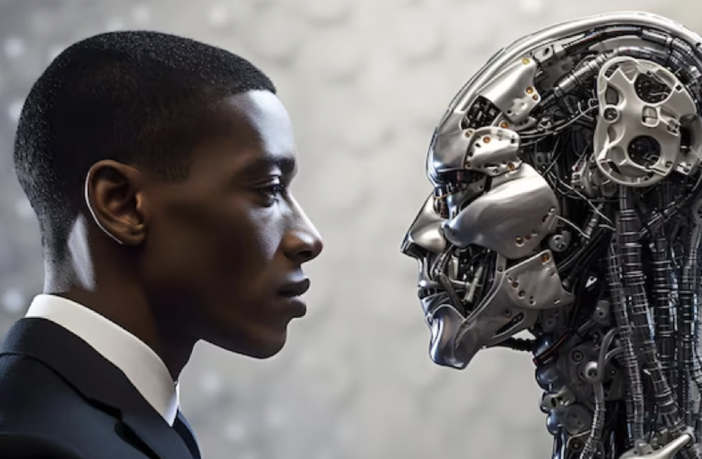Last Updated on August 20, 2024 by BVN
Overview: Artificial intelligence (AI) is rapidly changing the nature of work, with potential to eliminate jobs and create new employment sectors. AI will enhance the work of STEM, creative, business and legal professionals and it will not eliminate a significant number of jobs in these areas. It is however, expected to shrink job demand in occupations within customer service, food services, and production work–areas where Black Americans are highly concentrated. It is important that steps are taken to help ensure employment better paying employment opportunities for these workers by implementing strategies beyond training that highlight the importance of effective job matching, different hiring and training practices by employers, and better geographic mobility.
S.E. Williams
Today, we watch with our eyes wide open as artificial intelligence (AI) propels us toward the future, changing the nature of work and job sectors in ways not seen since the adaptation of computer technology in the workplace, and previous to that, the nation’s headlong entrance to the industrial revolution.
In each instance, there was a massive shift in the relationship between individuals and their work especially for whites, while for Blacks and other minorities, the shift often led initially to the unemployment line as technology replaced people—a shift that separated them from their livelihood, making their precarious place in America’s economy, even more tenuous. We’ve seen it all before even on smaller scales, and as jobs shift, evolve, and at times, disappear, the employees most often impacted are unskilled workers. Many of these workers, due to systemic and structural inequalities, are people of color.
In the last 50 years or so, we have borne witness to the evolution of a digitally driven economy that has completely changed the nature of work and in the process, eliminated jobs while at the same time, creating new employment/economic sectors. Now, we are braced for even greater change as AI further impacts service and other industries.
“Automation replaces men. This is of course nothing new. What is new is that now, unlike most earlier periods, the displaced men have nowhere to go.”
James Boggs, The American Revolution: Pages from a Negro Worker’s Notebook
Certainly, we can’t stop progress but based on past experience we should be able to do a better job of preparing society for it, especially as it relates to the economy, employment and equity.
The supermarket industry is currently under the microscope due to its deployment of technology that has reduced the number of workers needed to move customers through the checkout process.
SB 1446, still working its way through the legislature, is intended to safeguard unions job by limiting the use of self-service checkout counters and setting staffing at certain levels. The bill would also require grocers and other retailers to provide their employees with a 60-day notice before introducing new technology. This includes things like robotics, wearable sensors, and/or scanners that can eliminate, automate, or electronically monitor the core job functions of an employee.
SB 1446 has set up a contentious push and pull between grocers, retailers and labor unions. Some of the usually arguments coming from both sides include everything from employee safety concerns on the one hand, to increased operational costs that would raise grocery prices on the other.
This legislation, though it expands the conversation around jobs and the impact of AI, is far too limited in scope to address the full magnitude of the issue.
California prides itself on managing the economy and job creation, but historically–like the nation as a whole– it has failed miserably when it comes to Blacks, equity and the economy. Today, the warning lights as they relate to the potential impacts of AI on working people, especially people of color, particularly Blacks, are blinking bright red.
The McKinsey Global Institute released a report in July 2023, on generative AI and the future of work in the United States.
The report layered concerns about emerging vulnerabilities over optimism fueled by advancing technologies. While the report praised the economic growth brought by advancing technologies, it warned about the increasing challenges for some of the most marginalized workers in the economy. The report predicted that the future of work, will continuously shrink demand in occupations within customer service, food services, and production work. These are all areas in which Black Americans are highly concentrated.
Black Americans are highly concentrated in occupations within customer service, food services and production work where the impacts of Artificial Intelligence will continuously shrink demand in occupations. (source: census.gov)
The report’s predictions exacerbate existing concerns by some economic forecasters who note that what they define as “job-stealing robots,” may create even more hardships for minority workers that are already vulnerable.
For example, according to the report, “by 2030, activities that account for up to 30 percent of hours currently worked across the US economy could be automated.” This trend will be accelerated by AI. And while AI will enhance the way “STEM, creative, and business and legal professionals work,” it will not eliminate a significant number of jobs in these areas. The biggest impacts will more than likely impact job categories like office support, customer service, and food service. It is believed that employment in these areas may continue to decline.
But, AI is already here. What is the solution? Although training Black workers in pertinent skills might seem like a blinding flash of the obvious, U.S. policy seems to fall apart for Blacks and other minorities whenever such policy intersects with issues of racial justice and the economy.
Unlike during other periods of economic shifts, this state, this nation, must do better. Passing legislation like SB 1446 to protect workers may help on an interim basis; retraining workers can also be an important temporary measure; but, until the systemic and institutional foundations that undergird economic inequities are torn down, it doesn’t matter what we call the economic shift…reconstruction…industrial revolution…the information age… or today’s era of artificial intelligence–for Blacks, economic issues evolving from the need for racial justice will persist.
There are, however, reasons to remain hopeful. “Automation is not occurring in a vacuum,” the report noted. There are other trends affecting the demand for certain occupations, and the employment mix is expected to continue changing significantly through 2030.
Experts project growing needs in the fields of healthcare, STEM, and managerial positions even as jobs in customer service, office support, and food services continue to decline. In addition, especially here in CA, there will be job losses matched by job gains as we move to a net-zero emissions goal. Another bright spot is the Biden/Harris bi-partisian infrastructure bill that has spread infrastructure projects across the country and it is expected to bolster construction jobs, with an anticipated employment growth rate of about 12 percent through 2030.
The McKinsey Global Institute noted how helping workers in lower-wage jobs where occupations are shrinking move into better paying jobs with greater stability, will require more than access to training programs. It also stressed the “importance of effective job matching, different hiring and training practices by employers, and better geographic mobility.”
We must prepare for the increasing impacts of generative AI with a greater sense of urgency than we’ve used in the past as we entered periods of great economic transitions.
Of course, this is just my opinion. I’m keeping it real.



